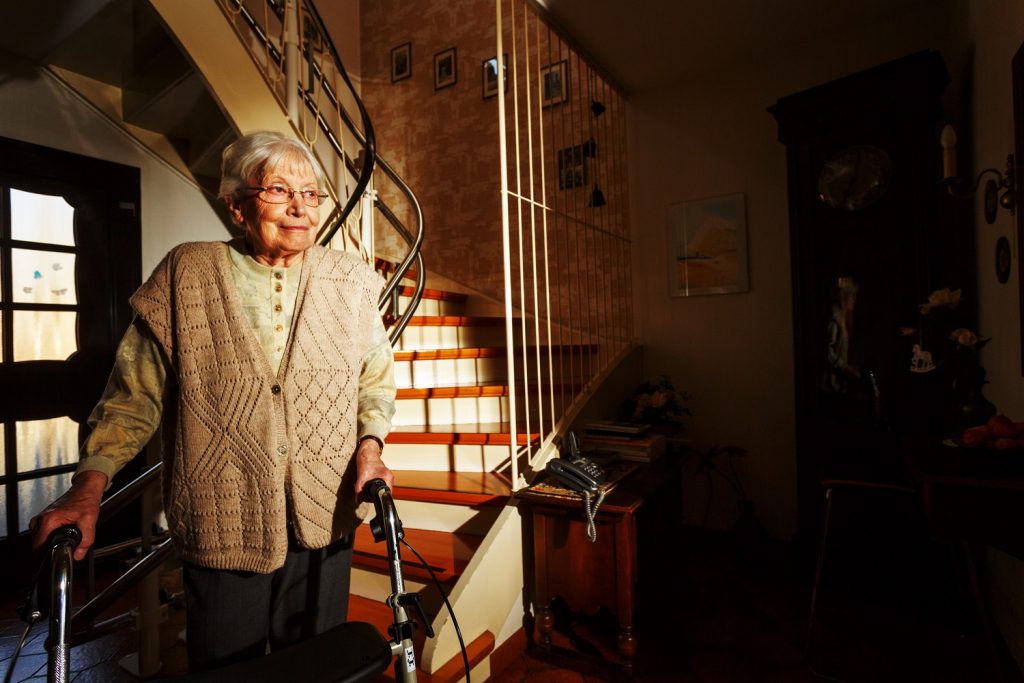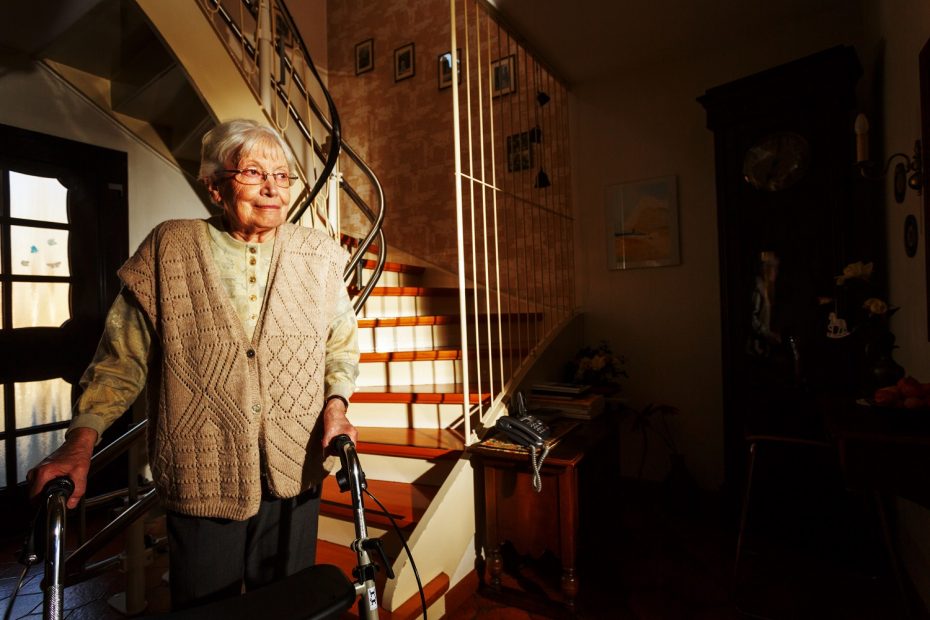
Wandering is one of many symptoms of Alzheimer’s disease. The Alzheimer’s Association reports that one in six seniors with dementia will wander at least once, and many do so repeatedly. Wandering can be dangerous, so caregivers should reduce this activity in their elderly loved ones.
Alzheimer’s disease affects the brain, causing seniors with the condition to no longer be able to recognize familiar places, people, or even their own name and address. Dementia patients can become confused about their location, which can lead to dangerous situations.
Seniors may wander due to several causes, such as boredom or the fear and stress of being in an overstimulating environment. Basic needs for food, water, or fresh air may cause the senior to wander in search of them. They may simply get lost when looking for someone or something.
What are the signs of wandering?
The risk for wandering is not limited to a particular stage of Alzheimer’s disease. Rather, a dementia patient at any stage of the condition is vulnerable to wandering. Several common signs can warn caregivers that a senior with dementia is likely to wander.
When dementia patients return from a walk later than usual or forget how to travel to familiar destinations, wandering is more likely. Some seniors with Alzheimer’s talk about wanting to “go home” or attempt to do so even when they are sitting in their living rooms.
Retired seniors who may wander are those who discuss the need to complete duties they had while employed. At home, they may act as if they’re engaged in a chore or hobby, but the task is never completed. These seniors may appear lost in a new or different environment.
Seniors who may wander begin to feel nervous or anxious in crowded public areas, such as restaurants or shops. Pacing, restlessness, and repetitive movements can clue a caregiver in that the senior is about to wander. The dementia patient may also ask the whereabouts of past friends.
How do caregivers reduce wandering?
Caregivers naturally want to reduce an elderly care recipient’s tendency to wander. Several tactics can be implemented to prevent wandering and ensure the senior’s safety. One is to monitor the senior at all times, never leaving the individual alone at home or in a car.
Provide structure within the senior’s day. A daily routine helps dementia patients know what to expect. If the older adult wanders at a particular time of day, plan meaningful activities for that time. Activities, like exercise and sleep, help reduce anxiety, restlessness, and agitation.
Ensure the senior’s basic needs for nutrition and hydration are met. If the senior is hungry or thirsty, he may wander in search of snacks or drinks. Similarly, an aging adult may need to use the bathroom and wander. Reduce wandering at night by reducing liquids two hours before bed.
When out and about with a dementia patient, caregivers are advised to avoid busy places that can cause disorientation or confusion. Grocery stores and shopping malls are examples of public areas that can be overstimulating for a senior with Alzheimer’s disease.
Caregivers should ensure that dementia patients always carry ID. Preferably, the ID will be in the form of a bracelet or pendant that the senior cannot accidentally or deliberately take off. A senior who carries ID in a purse or wallet can easily remove it.
Dementia patients who are still able to safely drive should be provided with a GPS device to find their way in the event they get lost. If the senior no longer drives, remove access to car keys. The aging adult may forget he doesn’t drive and wander by vehicle.
The home can be slightly modified to reduce wandering, as well. Install locks out of the line of sight—but never lock the senior in at home. Use childproof knobs on the doors. If necessary, build a fence around the yard and install bars on the windows.
Hang signs on the exterior doors that read “Stop” or “Do Not Enter.” Also place signs, like “Bathroom,” on other doors to prevent the senior from accidentally walking outside. Doors can be camouflaged with removable curtains or screens to deter the senior from wandering out.
Caregivers might hang bells above doors or use an alarm system that notifies them when the dementia patient opens a door. Likewise, a pressure-sensitive mat placed at the front door or the senior’s bedside alerts the caregiver that movement has occurred.
Importance of Reducing Wandering
Preventing wandering is critical to a senior’s safety. Involve friends and neighbors, asking them to call if they notice the senior out alone. Keep an updated photo and medical records for police. Know places the senior may wander to, such as a place of worship, favorite restaurant, or former home.
Wandering can be life-threatening to a senior with Alzheimer’s disease. Families can reduce wandering in their elderly loved one by providing constant supervision, establishing a daily routine, and ensuring all basic needs are met. Caregivers from Assisting Hands Home Care provide these care services and more.
Dementia care from our reputable home care agency supports seniors in everyday life. Our professional caregivers are trained to identify symptoms of dementia and respond with compassion. We remain with the senior at all times and ensure all needs for food, hydration, and toileting are met to limit wandering.
Agitated seniors under our care are calmed by distractions. Incontinence issues are discreetly handled by our memory caregivers. We also serve as pleasant companions to prevent loneliness and isolation. Additionally, our memory care services include help with the activities of daily living.
Professional caregivers prepare nutritious meals, shop for fresh groceries, provide transportation to doctors’ offices or senior centers, and perform light housekeeping. If your loved one takes medications, we give timely medication reminders to ensure medication compliance. We also assess the home for fall risks.
Memory care from Assisting Hands Home Care is valued by families with seniors living in Glen Ellyn, IL | Warrenville, IL | Naperville, IL | Westmont, IL | Woodridge, IL | Lisle, IL | Wheaton, IL , and the neighboring communities. When you seek compassionate dementia care, call our home care agency for a free in-home consultation, and promote the safety and comfort of your loved one.
















